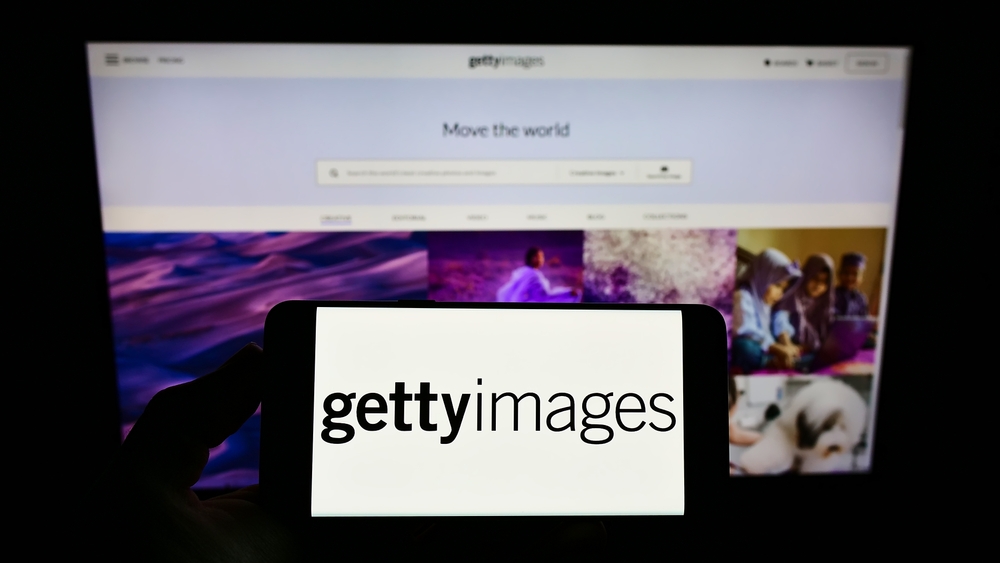Getty Images unveiled a generative artificial intelligence (AI) tool targeting to deliver visuals unhindered by copyright encumbrances for commercial utilization. The new tool targets safe visuals by overcoming the unauthorized usage of copyrighted images to train artificial intelligence models.
Getty Images revealed in a recent statement that the tool can mitigate unauthorized usage of copyrighted material to generate images. As such, the Generative AI by Getty Images exclusively relied on the enormous library of licensed and wholly owned images in training the model. By doing so, the outcome yielded commercially safe AI-generated images.
Getty Images Wrestles MidJourney and Stable Diffusion in Generating Visuals
The move by Getty Images portrays attempts to draw users currently reliant on other AI-powered image generators, including Stable Diffusion and Midjourney. The images generated under other platforms have drawn legal scrutiny. The new Getty Images platform overcomes reasons warranting legal scrutiny, allowing its users to create uncapped indemnification visuals.
Getty Images chief executive Craig Peters indicated that the AI-powered tool offers an exclusive indemnified service that is commercially safe. Besides, the AI-powered tool offers images of superior quality despite the capability to access it using an API.
Peters indicated that one can customize the Generative AI to realize a unique fit. Besides, the visual generative platform accommodates training over time to guarantee that brands can use the resulting images for their intellectual property (IP).
Getty Images revealed that its generative AI tool is leveraging NVIDIA’s Picasso, recently unveiled by the component and chip maker in March. Peters profiled generative AI as a set of tools and platforms reliant on prompts fed to produce new content ranging from videos, music, text and visuals.
Peters indicated that Getty Images is unveiling the best tech partner they would demand. The executive indicated that NVIDIA pioneered the generative adversarial networks (GANS) that eased text-to-image conversion. He lauded the chipmaker for presenting the best access to GPUs globally.
Getty Images Blocks Prompts Linked with Generating Problematic Content
Peters acknowledged that scammers are having a field day by utilizing AI image generators to create deepfakes. The scammers target celebrities and politicians obviously for extortion. The ease of generating deepfakes is raising concerns among policymakers and cybersecurity specialist firms.
Peters indicates that preventing its platform from creating illegal deepfakes is a priority for Getty Images. The chief executive assured implementing critical safeguards to block the prompts capable of generating the problematic content.
Peters outlined that the Getty Images AI is a product of training to curate and clean databases carefully. It targets excluding the properly licensed visuals of individuals and various locations. As such, it excludes the brands secured through intellectual property protection. Also excluded are the recognizable public figures scammers have targeted to create the deepfakes.
The move to exclude copyrighted material from the Getty Images AI is awareness of the lawsuits linked with utilizing internet-accessed materials. Recently, AI developers have become targets for suits alleging unauthorized usage of images to train AI models.
Peters recounts that Getty Images initiated a lawsuit in February alleging the Stable Diffusion developer – Stability AI, infringed copyright. He explained that Stability AI misappropriated Getty Images IP when training a model without permission. The executive expressed disappointment since individuals should create things they exercise ownership of and decide their usage.
Getty Images Rules Out Licensing User-Generated Images
Getty Images indicates that the user-generated images and prompt feeds are applicable to train its AI models. Nonetheless, the executive ruled out licensing or uploading the user-generated images to the company’s website.
Peters indicated that the images the users generate can be utilized as they desire. He ruled out bringing the images to the pre-shot catalogue. The exclusion of AI-generated images is a cautious measure since the company is unaware of the provenance utilized in its creation.
The approach by Getty Images counters the move by rival Shutterstock to allow ChatGPT builder OpenAI to utilize its expansive image library in training the generative models. OpenAI has, in the previous week, unveiled the Dall-E involved in generating text prompts for images.
Peters reiterated that Getty Images will prioritize offering the customers the best possible experiences while eliminating IP-related concerns. As such, he indicated that the customer-centric approach would enable creative users while improving the non-creative work.
Editorial credit: T. Schneider / Shutterstock.com
